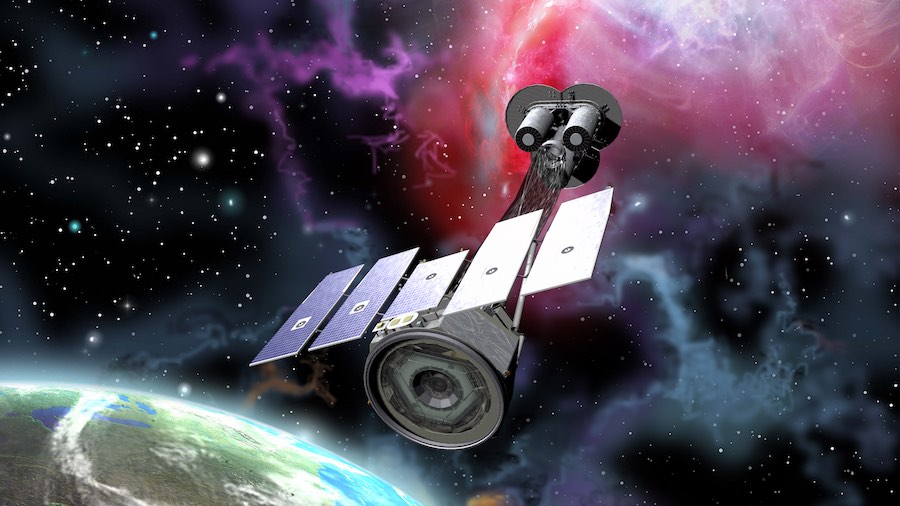
SpaceX completed a static fire test of a Falcon 9 rocket Saturday at NASA’s Kennedy Space Center in preparation for a launch Dec. 9 with the space agency’s Imaging X-ray Polarimetry Explorer science mission.
The test-firing of the Falcon 9 rocket occurred at 12:18 p.m. EST (1718 GMT) on pad 39A at the Florida spaceport. SpaceX rolled the rocket, without its payload fairing or the IXPE spacecraft, out to pad 39A Friday afternoon and raised it vertical on the launch mount overnight.
SpaceX loaded kerosene and liquid oxygen into the two-stage launcher beginning 35 minutes prior to the static fire test. The nine Merlin engines at the bottom of the booster ignited for less than 10 seconds as hold-down restraints kept the Falcon 9 on the ground.
The static fire test is a customary part of most SpaceX launch campaigns, giving engineers a chance to rehearse countdown procedures and verify ground and rocket systems are ready for launch day.
SpaceX engineers will review data from the test-firing to ensure everything worked as expected. Teams will lower the Falcon 9 rocket and return it to the hangar a quarter-mile south of pad 39A for attachment of NASA’s IXPE spacecraft.
The fully-assembled launch vehicle will return to pad 39A Tuesday in preparation for a 90-minute launch window Thursday, Dec. 9, opening at 1 a.m. EST (0600 GMT).
The IXPE mission is designed to measure the polarization of high-energy cosmic X-rays, collecting data that will allow astronomers to study the unseen environment around black holes, neutron stars and pulsars, the extremely dense collapsed remains left behind by exploding stars.
Astronomers hope IXPE will reveal the spin of black holes, and yield new discoveries about the extreme magnetic fields around a special type of neutron star called magnetars.
In order to obtain the sensitivity required for the X-ray research, the IXPE observatory will host three identical X-ray telescopes that will be extended after launch on a 13-foot (4-meter) boom. Built at Marshall Space Flight Center, the mirror module assemblies at the end of the boom will focus X-rays onto detectors provided by ASI, the Italian space agency.
The IXPE spacecraft, built by Ball Aerospace, weighs 727 pounds (330 kilograms) at launch, according to a NASA spokesperson.

The relatively small size and mass of the IXPE observatory falls well short of the normal capacity of SpaceX’s Falcon 9 rocket.
But IXPE will launch in a unique equatorial orbit from Cape Canaveral, requiring a significant sideways burn, or plane change maneuver, with the Falcon 9’s upper stage before deployment of the spacecraft at an altitude around 335 miles (540 kilometers).
NASA selected IXPE to become the next in the agency’s line of Small Explorer missions in January 2017. At the time, NASA said the IXPE mission would cost $188 million, covering development of the spacecraft and its X-ray telescope payload, a launch vehicle, and two years of operations.
In 2019, NASA signed a $50.3 million contract with SpaceX to launch the IXPE satellite on a previously-flown Falcon 9 booster from the Kennedy Space Center.
The orbit hugging the equator will minimize the X-ray instrument’s exposure to radiation in the South Atlantic Anomaly, the region where the inner Van Allen radiation belt comes closest to Earth’s surface.
The launch of IXPE will mark the 28th launch of a SpaceX Falcon 9 rocket this year, following a blastoff Thursday night from nearby pad 40 at Cape Canaveral Space Force Station with the next batch of Starlink internet satellites.
SpaceX plans to recover the first stage booster after the IXPE launch on the drone ship “Just Read the Instructions” in the Atlantic Ocean east of Florida.
Email the author.
Follow Stephen Clark on Twitter: @StephenClark1.
from Spaceflight Now https://ift.tt/3dmtDrj
via World Space Info







0 comments:
Post a Comment